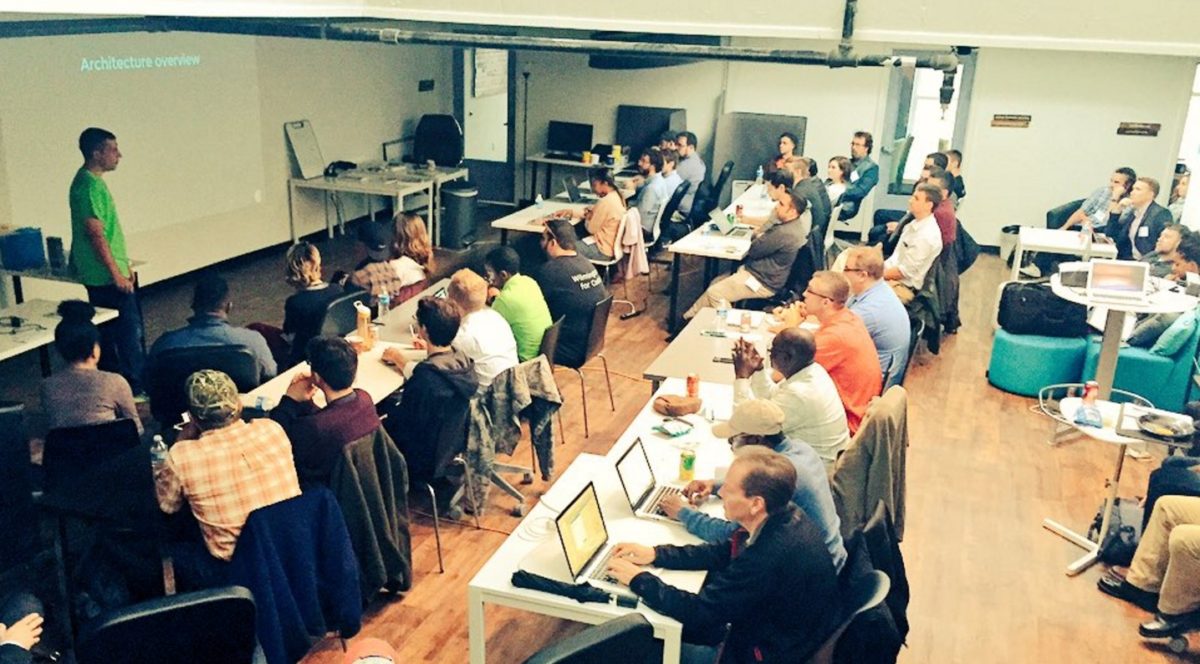If Wilmington is going to have a community of technologists, then show off the smartest of them.
Local tech aficionados packed the North Market Street coworking space coIN Loft on Thursday to listen to intensive case studies on how software is being built and coding used in the First State. Part of the Delaware Innovation Week Dev Conf and following a morning of coding classes, the event was moderated by Dominique Clarke, Zip Code Wilmington’s community engagement Manager. The DIW15 title sponsor was 1313 Innovation, and the afternoon was sponsored by JP Morgan Chase and Chatham Financial.
Find all the slides here from the day’s presentations. Below find a nugget of knowledge from each presentation:
https://twitter.com/Dinnovationweek/status/667406654917361664
1) The Angular community had a collective “Oh No” moment about a year ago when it was announced that 2.0 would be a complete break from 1.*. To help ease the process, Kurt Legerlotz from Chatham recommended learning TypeScript and using the Angular tool ngUpgrade
2) A lot of communication is nonverbal, including facial expressions and body language. That communication is lost in email and texting. Even 2-D video conferencing cuts a lot out. Albert Baldwin wants to fix that with Virtual Reality. “This is not the future, this is happening right now,” said the AlfaOmega Grafix founder while wearing a motion capture suit.
https://twitter.com/coINLoftDE/status/667413290293809152
3) Why is your website slow? Check out the images. John Himics of First Ascent Design gave some tips about decreasing the file size. Step one is to resize your images. Do not make them smaller within the HTML, that’s wasteful. He recommends ImageMagick. Second, optimize your images. PNGquant for png’s, and Imgmin for jpeg.
4) Wilmington’s self-styled ‘Tech Councilman,’ Darius J. Brown of the third district, wants you to meet him at the intersection of finance and technology (a slide presentation with his headshot on them say so), with a dash of open gov spirit. The only thing he doesn’t like about his job is sending money to Silicon Valley. “I would love to have local solutions,” he said while challenging the room to think locally while developing technology they could sell to other cities all around the nation. If you have a local IT consulting firm or agency and you’re good, he wants to hire you.
https://twitter.com/startitupde/status/667417153520431104/photo/1?ref_src=twsrc%5Etfw
5) The American Disabilities Act is not just for wheelchair ramps. Netflix was threatened with having to pay almost $800,000 to settle a case against them for not making their products accessible enough for people with physical and visual impairments. Ian Lebbern from Archer Group has three recommendations to test the accessibility of your website: Turn off style sheets, zoom in while increasing the text size, and put your mouse away. Seriously, try using your website with just the keyboard and get a taste of what it’s like to be a user with a physical disability.
6) The Ionic framework is “easy to use, and fast for prototyping,” said Kelsey Murphy. She shared the spotlight with Sam Kraft and Dawn Milnamow—a trifecta of current Zip Code Wilmington students. They walked through the process of building an app for TEDx Wilmington.
7) Strengthening the lock on your car door doesn’t do much good when it still has windows to break into. Phil Hagen of Red Canary and Beach Desks coworking space emphasized that security starts at step 0. Enforce strong passwords, encrypt them, set up 2-factor authentication, and log everything. Also, audit all of your modules, and keep them updated. Yes, even if it breaks your existing code and makes you rewrite other elements.
8) Do you still listen to cassette tapes? Then why do you still use a magnetic stripe for credit card payments? Both are easily copied. “Just like cards were shipped to your house, we ship cards to your device,” said Brian Smyth of JPMorgan Chase while describing the “Tokenization” method behind Chase Pay. To consumers, the tokens work like a credit card, but they are more secure on the credit processing side.
https://twitter.com/technicallyDE/status/667447694705729536
9) We’re in the third wave of open data, said Mark Headd of Accela. First there was FOIA, which was a good start 50 years ago. Next, in the 1980s, the government started providing aggregate data such as crash safety ratings. Now we’re in the raw data movement, where governments provide large data sets for citizens to sift through. Unfortunately, it’s often ugly. Headd open sourced a tool that saves the spreadsheet of Delaware restaurant inspections and places the locations on a map.
https://twitter.com/bryancordrey/status/667464247564201984
10) As Dogfish Head grew their customer base, they also had more website traffic. But they only had the expertise to serve one of those groups. Shaun Tyndall of Inclind helped scale Dogfish’s Drupal site, while also keeping it secure. For new clients, Tyndall says he breaks the cycle of “inheriting the past developers bad habits,” such as editing live websites. The first step is to create a dev instance that is tested before being pushed live.
11) If you’re building a web application, you’re going to be using API’s, or Application Programming Interfaces. Rory Laitila of the itr8group broke down the tradeoffs between performance and data consistency. The most consistent would be direct integration, where the API is referenced whenever data form it is needed. Unfortunately, that breaks performance. Instead, use a “Synchronizer” between your app and the API.
https://twitter.com/monaparikhesq/status/667461516560584712
12) If you’re building a web application, you’re going to need data binding. The most common is two-way binding, which can slow down performance. Miguel Zakharia, coordinator of the First State .Net user group, touted the benefits of two additional bindings available in Aurelia. One way binding and one time binding, which frees up resources.
The event was followed by a happy hour, where attendees grabbed a 16 Mile craft beer before slipping out into the rainy evening.







